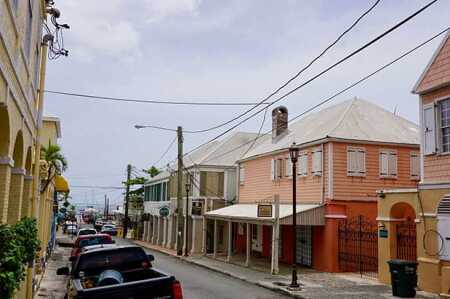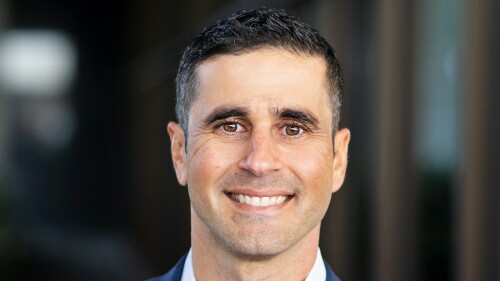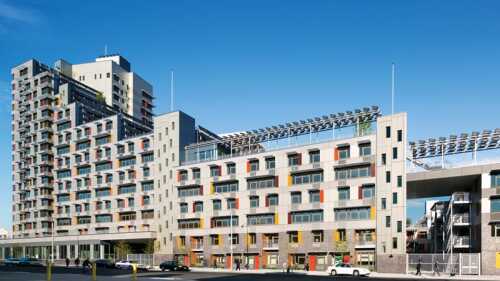Hit by two major hurricanes in 2017, St. Croix, one of the U.S. Virgin Islands, suffered significant damage. The island is poised to receive nearly $2 billion from the Federal Emergency Management Agency, a portion of which, if used strategically, could potentially be used to support the transformation of the island’s current social and economic footing. Bolstered by a rich cultural history and a vast population of resilient, determined residents, St. Croix has an opportunity to reposition itself as one of the most economically thriving and diverse U.S. Virgin Islands.
Though St. Croix has experienced some economic growth over the last several years, the island continues to face a variety of critical challenges hampering its continued economic sustainability. In the wake of two devastating hurricanes—Hurricane Irma and Hurricane Maria each rocked the island with Category 5 winds—St. Croix did receive federal funding to rehabilitate and restore the island. Now, island officials wish to use these funds in a manner that considers St. Croix’s long-term economic viability, making serious changes to its infrastructure while strengthening entrepreneurship, innovation, and housing affordability.
To further this effort, the Virgin Islands Housing Authority (VIHA), in consultation with the government of the Virgin Islands and the Virgin Islands Housing Finance Authority, decided to convene a ULI Advisory Services panel as an initial step in a long-term process to create an integrated approach to recovery and reconstruction efforts and reach community consensus about how the territory should evolve over the next 20 years. The panel put an emphasis on bolstering the island’s economic growth through smaller scale, equitable, and entrepreneurship focused investments. In addition, panelists provided recommendations to help the VIHA in their reimagining of the island’s current housing framework, with an emphasis towards lower construction costs and greater community participation. Finally, the panel identified that St. Croix’s specific cultural heritage can be more successfully leveraged as a unique tourism driver.
Along with Robert Graham, the executive director of the Virgin Islands Housing Authority and acting as the panel’s sponsor, the panel was led by Carlton Brown, a principal at Direct Invest in New York, and April Anderson Lameroux, president, Strategic Advisors LLC, Boston. Brown and Lameroux were joined by Nick Egelanian, president and founder, SiteWorks Retail Real Estate, Annapolis, Maryland; R. David Gibbs, renewable energy consultant, Brooklyn, New York; Robin Hughes, president and chief executive officer, Abode Communities, Los Angeles; Sandra Kulli, president, Kulli Marketing, Los Angeles; Amie MacPhee, founder and owner, Cultivate Studio, San Francisco; Kim Morque, principal and president, Spinnaker Real Estate Partners, Norwalk, Connecticut; Mehul Patel, chief operating officer, Midwood Investment and Development, New York City; and Adam Weers, principal, Trammell Crow Company, Washington, D.C.
In making its recommendations, the panel reviewed plans, studies, and data points while interviewing community stakeholders related to the island’s current economic outlook. Their goal was to arm the island with a resilience plan that encourages quick recovery after inevitable economic and climate-related shocks. The closure of the Hovensa oil refinery in 2012, one of the area’s largest employers, resulted in a major economic loss for the area and as many stakeholders noted to the panel was more devastating economically than the hurricanes. (Note: In July, after the conclusion of this panel, the U.S. Virgin Islands announced that the refinery would reopen in a $1.4 billion deal with ArcLight Capital Partners.) The island enjoys an exceptional natural environment, with pristine beaches and good weather year-round. Of course, its geographic location also contributes to the island’s susceptibility for major natural disasters, including rampant flooding in key historic and touristic areas. These issues have further hampered the island’s connectivity, as major storms often affect mobility and obstruct access to the island’s cultural and historic hubs. And while the local community is proud of their culture, community, and history, poverty is a critical issue among St. Croix residents. Affordable housing is considered inadequate by both residents and public officials; job growth is stagnant, with a double-digit unemployment rate; and a generational brain drain is contributing to the island’s stagnant economy.
In addressing these issues and presenting a plan, panelists spoke with a variety of residents, government officials, community organizations, small business owners, artists, real estate developers, and entrepreneurs. “The presentation and panel brought out the views of every constituent and every stakeholder that has an interest in the revitalization of St Croix,” notes Graham. “During a week of discussions and interviews, we documented the concerns, issues, and visions of all stakeholders to begin to forge a collaboration going forward.”
The panel made a number of strategic recommendations that centered around strengthening its entrepreneurial community while making improvements to its infrastructure and housing stock.
The panel noted several distinct opportunities to drive St. Croix’s current economic framework, and recommended that St. Croix focus intensively on entrepreneurship, particularly among low-income and public housing residents. “We asked ourselves, what are the basic fundamental assets they can work with here, besides tourism?” says Lameroux. “St. Croix has a very active artisan community, a large agricultural community, but no real formed coordination between these things.”
In making recommendations, Lameroux stressed the need for access to technology and innovation. “The island needs to create spaces, such as coworking spaces, and access to technology to help people start a business. Right now, there are artisans that can’t deliver their work because they don’t have internet access,” she says. Lameroux recommended a USVI online marketplace, where buyers and sellers can easily interact. In addition, St. Croix should capitalize on its long history of agricultural production and establish a food hub, even devoting staff members from the island’s economic development agency to establish the initiative. “The basic premise is to connect producer to consumer and create a series of connections between restaurants, grocers, and small-scale farms,” says Lameroux.
Developing an entrepreneurial framework will, in turn, fuel new housing development and construction, with opportunities to source and refine low-cost materials on the island while providing temporary construction jobs. “It costs as much, if not more, to build an 800-square-foot [74 sq m] apartment in St. Croix as it does in New York City because all the materials are shipped in,” says Brown. Instead, Brown suggests that local entrepreneurs redevelop the Danish practice of building sustainably with locally sourced materials in developing more affordable housing, which would also alleviate higher electricity costs and better serve the residents within those units. “We suggested that St. Croix hold a design competition where architects can think about a small-scale project to demonstrate vernacular architecture that was more energy efficient and doesn’t cost so much to build,” says Brown. “This, in turn, could grow a workforce using local materials and they can think about rebuilding and training them to think about it differently.”
Currently, affordable housing—both improvements and new units—is in extremely high demand, due to high unemployment rates. According to Robin Hughes, president and chief executive officer, Abode Communities, the Housing Authority should focus on instituting a competitive process for selecting developers, with the recommendation that selected developers be assigned multiple sites. “One of the biggest challenges the island has is trusting talent to do the developing,” she says. “How do you get the right developers to come and do it? The commitment has to be to work consistently with certain developers over the long term.” Hughes also stresses the need to cultivate and develop local talent, particularly contractors, as part of this process. Finally, the Housing Authority should take steps to keep public housing residents informed and engaged, while minimizing displacement through an adequate phasing model.
The panel additionally made recommendations regarding St. Croix’s infrastructure, which should encompass a plan for capitalizing on its natural environment, sustaining its historic character, and revamping its transportation framework. These measures would include designing a comprehensive open-space system that includes parks, greenways, a sea park, flood control retention, and a path system. Green infrastructure—including swales, retention ponds, and renewable energy systems for emergency backup situations—would be integrated into the system. Along with creating more green infrastructure, panelists recommended that the government consider leveraging the existing electrical utility assets differently, determining that private capital would allow St. Croix to invest in new renewable energy infrastructure. This would reduce electricity costs while employing sustainable environmental practices.
To improve mobility, the panel recommended that existing transportation infrastructure be modified to more effectively accommodate multimodal transportation infrastructure. The panelists recommended that St. Croix place an increased emphasis on ride-sharing systems to enhance accessibility and affordability, bike and pedestrian walkways to bridge the gap between residents and tourists, and encourage gatherings in downtown Christiansted. These plans not only would create an improved framework for storm mitigation by decreasing dependence on gas-powered cars and buses and reducing road congestion, but also would further the island’s entrepreneurial mission while highlighting St. Croix’s important cultural and historic roots.
Panelists lastly encouraged St. Croix to maintain a focus on incremental strategies while avoiding the temptation of trying to make all these improvements at once. “Our message was if you want to be successful long-term, you want to focus on smaller incremental improvements. Focus on microgrants, agricultural and fishing cooperatives, and really listen to what the community wants,” says Patel. “Utilizing the resources they already have . . . is a better strategy for success.”
Reimagining an island is no simple task, but the panel’s recommendations aim to help St. Croix create a more connected and resilient community. In the case of St. Croix, capitalizing on its unique natural and cultural environments and incrementally making infrastructure improvements could be the catalyst for sustainable economic growth. Ultimately, the panel’s proposed recommendations suggest that equitable economic development should be the principal focal point for St. Croix’s resilience efforts, as climate disturbances will only be exacerbated if a robust economy is not in place. Focusing on technology, encouraging entrepreneurship, and making transportation infrastructure and housing improvements will address connectivity issues and create a more invested community, and place this Caribbean island on a path toward economic growth.
Since 1947, ULI Advisory Services panels have helped communities find strategic, practical solutions for the most challenging issues facing today’s urban, suburban, and rural areas. During a concentrated one-week effort, panels address challenging real estate and land use issues and provide solutions. Panels, Reports, and Presentations








